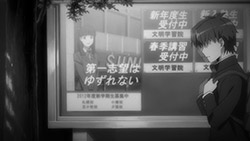 |
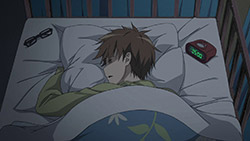 |
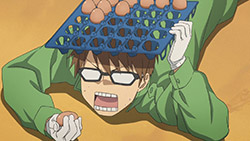 |
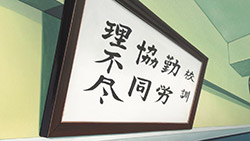 |
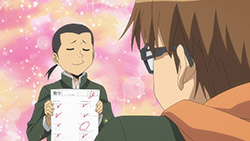 |
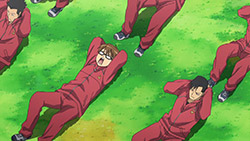 |
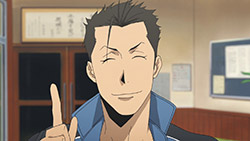 |
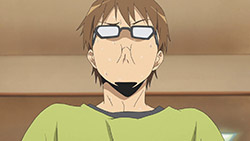 |
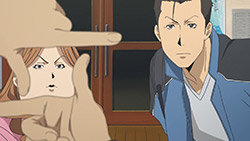 |
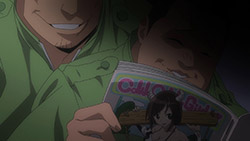 |
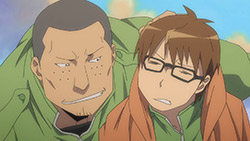 |
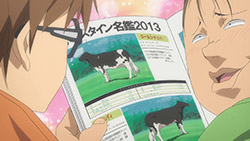 |
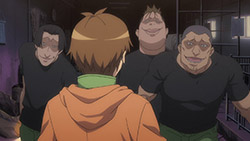 |
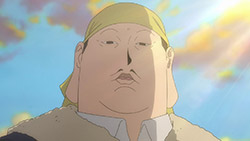 |
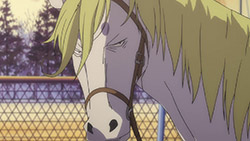 |
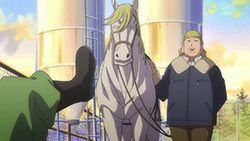 |
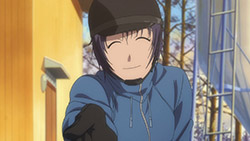 |
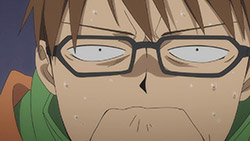 |
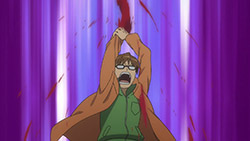 |
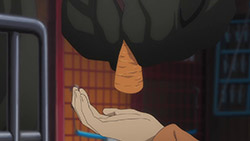 |
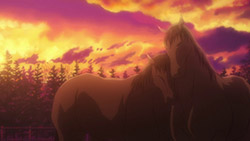 |
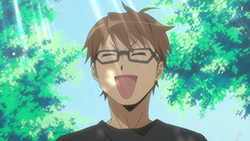 |
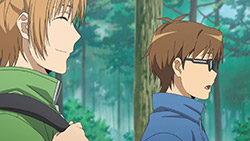 |
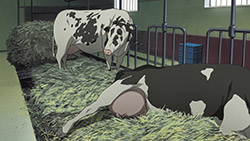 |
 |
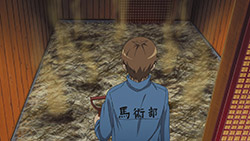 |
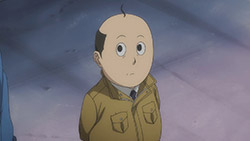 |
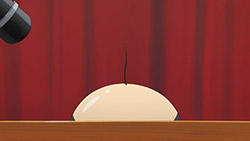 |
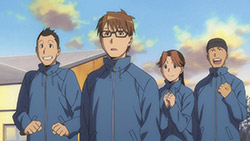 |
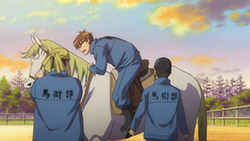 |
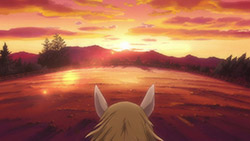 |
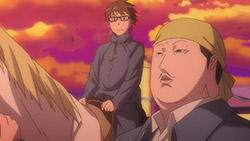 |
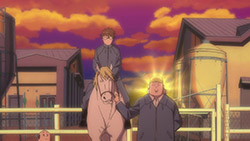 |
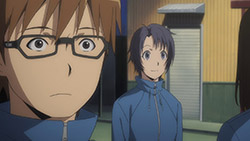 |
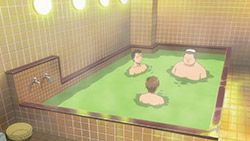 |
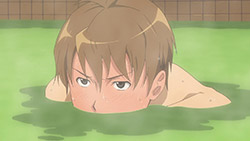 |
「八軒、馬に乗る」 (Hachiken, Uma ni Noru)
“Hachiken Rides a Horse”
There’s no denying that Gin no Saji represents a huge change-of-pace, in just about every way.
There’s not much about Silver Spoon that’s by-the-books. This is the sort of anime about which my friend in the film and TV business – who basically still thinks of anime as all giant robots and space battles – would ask, "Why are they even doing this animated? It could just as easily be live-action." It’s a story that gets right down in the muck (literally) celebrates the unglamorous, and comes from a mangaka whose last work was one of the most beloved fantasy series in shounen history. In short, Gin no Saji doesn’t really make a whole lot of sense.
Perhaps the most surprising thing of all about this series is that it’s been one of the most dominant manga commercially since its introduction. Arakawa-sensei’s name no doubt got a lot of people through the door, but Silver Spoon has managed to keep them there despite not pushing many traditional shounen buttons – each volume is a blockbuster and the series is among the Top-10 sellers in Japan (last week Volume 8 was #1 on the bestseller list, at almost 500,000 copies – including the special edition with the “Holstein Club hand towel”). It remains to be seen if that commercial success will translate to the anime – I have severe doubts it will do well on Blu-ray as that’s a very different segment of the market than the one buying this manga, but this is also the sort of anime that’s probably expected to do more to cross-promote the series’ brand than sell discs, more like a shoujo or seinen title.
None of that would matter if the series wasn’t any good, but fortunately it is. I won’t claim this is one of the most exciting series you’ll ever see (so far anyway) but it’s managed to get me invested in a lifestyle I know almost nothing about. The most striking thing for me in watching this second episode is just how difficult life is for Hachiken and his classmates at Ooezo High School. They wake up ay 5 AM for practicals. They have a full day of classes both academic and agriculturally focused, and are allowed 10 minutes for a bath in the evening. They’re required to join a club, despite their workload. And much of their day seems to be spent shovelling shit. Frankly, I’m exhausted just watching them.
In truth, I think this is all part of Arakawa’s homage to the agricultural life she grew up on. Even most city folk know that life on a farm is hard, but it’s interesting to see it portrayed here in pretty unvarnished terms. Gin no Saji is at least to some extent a simple argument for the virtues of hard work and the cleansing power of sweat and toil. The students are, as an instructor tells Hachi-kun, "slaves of the livestock". It’s the livestock who bring in the money and in hard practical terms, what these kids are at Ooezo to do is learn how to make money off livestock (and crops) in the 21st Century. It’s not pretty, and even in the confines of the school there’s disagreement on the merits of technology-based commercial farming and old-fashioned methods, as witness the debate between Tamako (Takagaki Ayahi) and her brother Shin’ichirou (Ono Yuuki) over the merits of additives in poultry production.
In story terms, the great unknown of Silver Spoon continues to be the main character. We still aren’t told just why Hachi-kun has decided to attend Ooezo, though it’s clear enough that he places a great value on academic ranking and disdains the idea of having goals. In spite of being something of a blank slate Hachiken comes off as a likeable lead – he’s very much playing the role of audience surrogate for now but quite effectively, and we’re starting to see signs that he’s warming to the challenge at hand. His personal journey is nudged along this week by the requirement that all students enroll in a club (the "Go-home Club" apparently not an option). Hachi-kun would of course rather rest up, but a rule is a rule – and every a brief but highly amusing encounter with the Holstein Society ("Look at those teats!") – he’s "rescued" by the Buddha-like instructor of the Equestrian Club Nakijima-sensei (a very funny Masutani Yasunori) he ends up joining the club we always figured he would.
There’s no question that Hachiken has ulterior motives (named Mikage-chan) for joining the EqC. And it ends up being quite different than he expected – including the heartbreaking news that first-years must wake at 4 AM to care for the horses. And Hachiken doesn’t even like horses – he’s quite scared of them in fact. But it’s another case where Arakawa is sharing her obvious love with the audience, because we get quite an education about the equine: about their timid and observant nature, about how to feed them (that flat-palm thing is indeed crucial) and about the joys to be derived from the experience of interacting with them. Indeed, there’s quite an elemental relationship between humans and horses – the word for "horse" is one of only about a dozen or so thought to be so old that it’s roots in human language predate the divergence of Proto-Indo-European (the precursor of most major European languages, including Latin and Greek) and Chinese – meaning the words are similar in modern European languages and Chinese and its descendant languages (like Japanese).
Probably the most important moment in terms of Hachi-kun’s development comes when he volunteers to care for the horses during Golden Week. It’s important because it means bonding time with Mikage, but even more because he did so without even knowing she would be staying behind too. Between that and Hachiken’s determination to help hapless teammate Tokiwa Keiji (Shouji Masayuki) with his math, it seems Hachiken is actually becoming involved with his surroundings – which the hints about him suggest is a major milestone. It would have been interesting to see Hachiken in his home environment – I expect that will come eventually – but for now, the priority is to flesh out the world of Ooezo Academy, and watch Hachi-kun struggle to figure out how he fits into it.

good episode and good writeup. i can’t help but notice that you dwell a lot more on the burdensome aspects of farm life that this anime has shown though. while it’s true that this show is indeed trying to convey that farm life is hard, it is also contributing an equal amount of effort to show the rewards that come with it. having freshly made food made by people invested into the science of it is very appealing, as well as being able to ride a horse. perhaps i’m easily moved but i received slight chills when hachiken finally straightened out his back atop the horse, the view was really nice and i can only imagine how much nicer it’d be in real life. farming is definitely a lot of work, but it’s also about seeing the fruits of your labor, something i think arakawa is doing pretty nicely. all this accompanied by its pleasant sense of humor really gives this series a refreshing and relaxed feel. i can definitely see myself looking forward to the next episode all season long.
This show is just like that smoked chicken; simple and good with no cheap additives.
This one always gave me the impression that it was a story Hiromu Arakawa always wanted to do- something close to her heart, perhaps related to her own life history (Maybe Hachiken is actually based off her husband or something). It’s the sort of thing that probably never would have been commercially viable on its own- but the runaway success of Fullmetal Alchemist injecting a healthy dose of star power into Arakawa’s name more or less anything goes for her now. Along with J.K. Rowling’s decidedly mediocre crime-novel that was outed recently it is evident that if your name as an author has enough clout behind it, you can get virtually anything to sell. Except Arakawa deserves far more credit than Rowling, who wrote what I hear by all (unbiased) accounts was a mechanically solid but ultimately uninspired and mundane mystery novel. Little to no innovation if any. Whereas due to its setting (Quite unexplored in manga/anime aside from Moyashimon) Silver Spoon is one of the most refreshing series in its industry to have emerged over the last few years, almost medium-breaking in some ways…
I have no bias for or against JK Rowling, but the reviews of “Cuckoo’s Calling” were generally glowing – before Rowling’s authorship was revealed. It’s certainly true that it was a minor book commercially before the secret got out and only became a bestseller because it did, but to give the woman her due that book was very well-received by the critics who noticed it existed (including Publishers Weekly, the most influential book review site in the U.S.).
My assessment is probably a little skewed. I’m sure you’re well aware that I value innovation very highly. For me it is not enough that something is merely mechmanically sound or even stellar- if it does nothing different then in the big picture to me it is “mediocre.” “Blockbuster” to me is the very definition of mediocrity- beyond sales, beyond reviews enduring remembrance is the true measure of greatness, and for this both mechanical superiority and innovation are requisite.
The stories that are remembered throughout the ages are those that manage to make a lasting mark of individuality upon the world after all- which by and large can only be achieved through innovation. And Cuckoo’s Calling is anything but…
Be that as it may, you said that the book received mediocre reviews – when it fact it received almost universally excellent reviews. That’s not a matter of your personal biases, it’s a matter of the public record. Whatever you may think of the book (I don’t know if you’ve read it or not, but I certainly hope you’re not dismissing it if you haven’t) don’t deny it the positive response it received.
“Excellent reviews” from traditional sources perhaps but many independent online reviewers are panning it for its lack of originality. And I am inclined to think that there is merit to those claims even though I indeed have not read the book. It is certainly not the “travesty” that they are calling it, but isn’t as wonderful as traditional sources are lauding it as either. Numbers speak, and there has to be an explanation for the book’s abysmal sales before she was outed as the author. So why was the book so unappealing on its own merits to the layman in spite of the unquestionable strength of its execution? It’s because execution alone isn’t enough to create mass appeal- professional critics laud good mechanical execution- the layman on the other hand only cares about things that stand out to him as having good entertainment value- execution is a part of that but equally important is originality. You could have the finest literary technique as mandated by the textbooks of creative writing school and your book will still be flop if it doesn’t distinguish itself as individually compelling. Cuckoo’s Calling failed marvelously to do so on its own merits before the prestige/herd mentality dynamics set in and only gained a massive following once Rowling was outed as the author.
I think you misunderstood my first comment. I am not saying that this book is mediocre as assessed by the critics- their assessments are irrelevant. What I meant to say is that as described by the critics this book is mediocre by my own standards. Whenever I evaluate something I only ever refer to my own system of evaluation. When I said “mediocre reviews” I meant the comments of the reviewers of both traditional sources and independent online reviewers when taken as a whole and applied to my own system of evaluation. The ultimate verdict of any reviewer is unimportant to me- my verdict is my own- when I drew from “sources” I meant to say that I drew general information and descriptions of the book from them- and as a whole when applied to my own system of evaluation falls short of greatness…
I am not attempting to say here that “All reviews I read called the book mediocre.” Rather, “mechanically solid but ultimately mundane” is the conclusion that I have personally come to about the book after superimposing the descriptions of it given by various accounts. “By all unbiased accounts” refers to my own personal aggregate observation of these accounts biased towards my own system of evaluation that weights innovation heavily…
this show is just shit compared to people’s expectations of the same author of FMA
^Exhibit A^ here proves my point. Even with Arakawa behind it there are still lots of folks who are simply incapable of appreciating this kind of show. She really does deserve mad props for using her clout as an author to try something innovative instead of cashing in with yet another crummy traditional shounen…
sasuga derprito
At least this guy’s a regular hating troll, hating for the sake of hating. Better than last week’s vegan-crusading nutter, hating simply because he got offended some obscure interpretation of Arakawa’s take on agriculturalism, which is simply absurd.
mmm
i couldn’t see more than 2 episodes of FMA (got bored.. maybe it gets better later? dunno never tried again)
Silver Spoon itoh.. seems really interested to be .. TBH i never linked FMA and Silver .. i guess that is a good thing on my book
To each their own i guess.
there are apparently people that is disappointed with gin no saji because it they think it does not live up to the expectations from FMA author. well to be simple, i still don’t understand why in the world people would compare FMA and gin no saji in the first place, i mean how can you even compare alchemy and farm life ?
I like this kind of alchemy.
https://randomc.net/image/Gin%20no%20Saji/Gin%20no%20Saji%20-%2002%20-%20Large%2019.jpg
Well, the part where he imagined the horse biting off his hand, if you take that screenshot out of context, it does seem like he’s just performed human transmutation. LOL
Surprisingly, i’m enjoying this series more than i suppose to.
Maybe my inner “havest-moon” loving spirit has been awaken. XD
I’ve always loved Harvest Moon, and I’ve always loved slice-of-life anime/manga. Add in characters that are extremely likeable and Arakawa’s distinct brand of crazy humor, and this show is gold for me.
“This cold be better in live action”
Better or not it will happen
I don’t care if the author is Arakawa or a nobody. I just want sometimes a refreshing and original plot. And here it is. I’m happy.
I just think it’s a big challenge to adapt such a work in anime, so I’m a little bit anxious… Until now, I think they did a good job, but not a *spectacular* job. I may be too harsh but I always have great expectations when I know the manga beforhand (and like it!), so I think I often end up disappointed.
Hachiken strikes me as this type of kid who doesn’t want to go on a “set” path but doesn’t know what to do move away from something he’s used to, which is to study his ass off. Like, whenever people talk about their goals on the show, he always looks stressed, like he’s suddenly getting judged because he probably doesn’t know what his endgame from school is.
What I enjoy about this show so much is the character design and character personality. You feel, despite many of them given such a little time on screen together, that each has a different life and they feel unique. Nailing character is one of the hardest things to do but it’s perfect here. I remember the picture of the whole class and not a one of the characters is a stock. They all look unique.
From there, the characters are enjoyable. I like the main and I’m curious about why he’s here. The cow jokes and chicken egg oddities are just icing for comedy. For me, the characters are the draw.
In my experience, when it first came out, I was excited because my favorite shounen author is making a new manga but when I read the first chapter I was like “meh, farming? not interested..” and left it alone. When the anime came out, I remembered about it and got curious, so I watch it and somehow got hooked. Then I do more research found out it is one of the best selling manga and got even more curious why is it popular. I read the manga and was so invested in it that in 1 day, I get to the point where you have to wait for a week for new chapter (the torture T.T). I admit there is no mechanical chicken or mutated cow in the series (spoilers? Haha) but it is damn interesting. I guess for a manga to be popular it must a very great story and awesome storytelling and publicity is a HUGE bonus IMO.
https://randomc.net/image/Gin%20no%20Saji/Gin%20no%20Saji%20-%2002%20-%20Large%2010.jpg
The good ol’ “Never judge a book by its cover.” Technically, the cover girl IS promoting cows.
Speaking of the Holstein Club, the way they grabbed hold of Aikawa upon his approaching their barn gate reminded me a lot of those hand-like tentacles from the Gate of Truth in FMA. XD
I don’t think that similarity was coincidental…
One of the many things I loved about Gin no Saji was Hachiken’s hilarious faces, and they were gloriously shown here. Especially when Aikawa announced his joining of the Holstein Club, because Hachiken’s face then made me laugh. I can’t wait to see more of the funny expressions Hachiken make. 8)
This may be one of my favorites of this season; it’s definite the show I laugh at most at least.
BTW Enzo, you said Hachi-kun disdains the idea of goals but I think he more or less is just indifferent to the idea of them or did not have any agriculture goal.
This is as pure as a slice of life can get. I don’t know about you guys but I absolutely love this series.
Also, no screenshot of the Hachiken-face after Aikawa told him that he’s joining the Holstein club?
That moment when Hachiken viewed the farm and the sunset from above the horse was a very powerful scene in the manga and one of my favorite parts. Even though I haven’t ridden a horse yet, that scene was very moving when I read it and understood what Nakajima-sensei wanted to say about riding.
And to my amazement, it still evoked the same feeling I felt back then. Maybe a bit more powerful now because of the encouraging shouts of the teacher to build it up plus the beautiful animation. And that subtle color change in Hachiken’s face and the soft breeze in his face just before he opened his eyes was a great great touch to it.
Awesome episode. I don’t care really about people having false assumptions about the story just because it’s the same author as FMA and dropping it because it’s not like it. I’ve had a lot of that when the manga started publishing.
This is a different story with a different feel and should be judged separately from her previous work. And this was the moment when I fell in love in the manga, and consequently this adaptation. Really looking forward to more.
Some people just insist on locking an artist into a box and expect variations on the same theme over and over again. True, there are some that are “one trick ponies”, but if you are really talented you can bring your abilities out to show your audience something new. And that’s what I’m always hoping to see.
Ths show has made me laugh a few times so far, but as someone who grew up on a farm in the US it has me a bit bored. Usually familiarity is a good thing as a viewer but this time it’s just making me remember the total lack of enjoyment at shoveling stalls, medicating cows and having to deal with the unholy smells of a chicken coup.
just like the 1st espisode…..at the end I feel hungry!
I’ve seen the people who complain about how this is not FMA, and how their expectations were shattered because it was completely different…to which I have to say that I actually very much enjoy it being completely different.
Arakawa has a very distinctive style of art, and many of the characters look similar to those in her other works. Maybe it’s just me, but I find it greatly amusing to see faces that she would use on villains being placed into this show where there are absolutely no bad guys. Despite scary appearances, everyone appears to be good, hardworking folk. Regular people. And there’s just something really pleasant about that.
I want smoked chicken and eggs now…
What Hachiken is going through is actually very common among young Asian students. Usually in Asian communities there is a stress on students to be perfect in academics and students end up studying 24/7 to get perfect grades and such. However what this results in are students who study for grades or perfection, not things they are interested in or care about, which leads to many students without any life goals. For some students who succeed they go on to college not really knowing what to do in life, and for students who fail, they feel even more useless because not only did they fail in academics but they don’t even have life goals to carry them through.
This is healing anime of the year. Watch and learn, Gargantia!